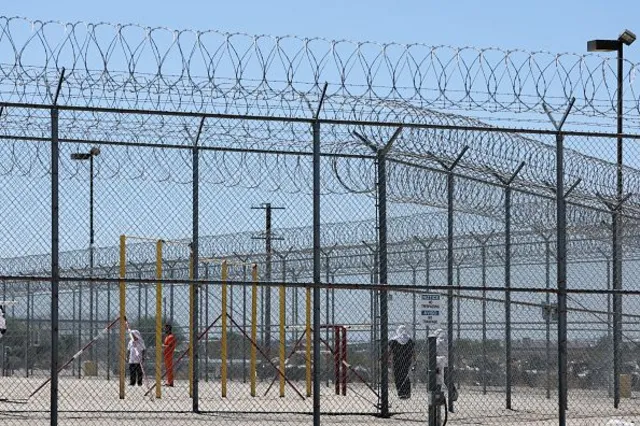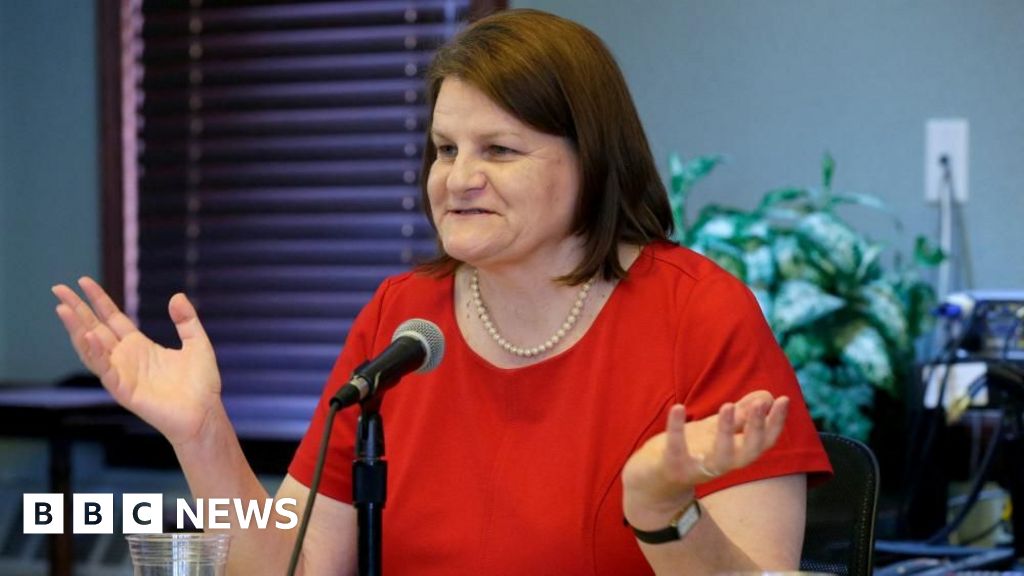Savita PatelCalifornia
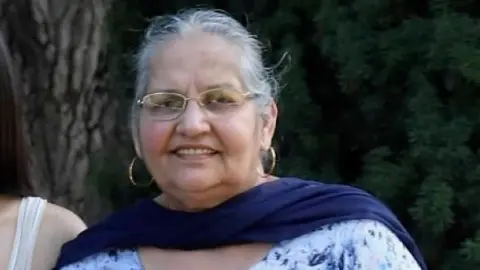 Manjit Kaur
Manjit KaurThe visiting room of the Mesa Verde ICE Processing Centre in Bakersfield, California, is small, loud, and crowded. When Harjit Kaur’s family arrived to see her, they could barely hear her – and the first words they caught shattered them.
“She said, ‘I would rather die than be in this facility. May God just take me now’,” recalled her distraught daughter-in-law, Manjit Kaur.
Harjit Kaur, 73, who unsuccessfully applied for asylum in the US, and has lived in California for more than three decades, was arrested by US Immigration and Customs Enforcement (ICE) officials on 8 September, sparking shock and sympathy from the Sikh community across the state and beyond.
Harjit Kaur had filed several asylum appeals over the years which were rejected, with the last denial in 2012, her lawyer said.
Since then, she had been asked to report to immigration authorities every six months. She was arrested in San Francisco when she had gone for a check-in.
It comes amid a wider crackdown by the Donald Trump administration on immigration, and especially alleged illegal immigrants in the US.
The issue is a sensitive one – the country is grappling with how to deal with the hundreds of thousands of asylum seekers who arrive at its borders every year. More than 3.7 million asylum cases are pending in immigration courts. An increased budget for immigration enforcement means ICE is now the highest-funded federal law enforcement agency.
Trump has said he wants to deport the “worst of the worst”, but critics say immigrants without criminal records who follow due process have also been targeted.
“Over 70% of people arrested by ICE have no criminal conviction,” said California State Senator Jesse Arreguin in a statement demanding Harjit Kaur’s release. “Now, they are literally going after peaceful grandmothers. This shameful act is harming our communities.”
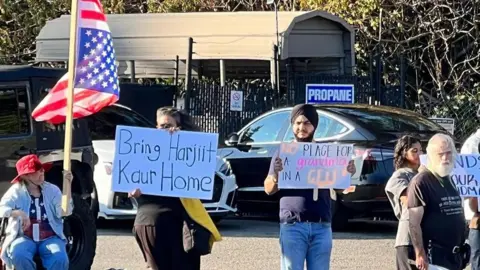 Courtesy Deepak Ahluwalia
Courtesy Deepak AhluwaliaUS Congressman John Garamendi, who represents the Californian district where Harjit Kaur lives, has submitted a request to ICE for her release.
“This administration’s decision to detain a 73-year-old woman – a respected member of the community with no criminal record who has faithfully reported to ICE every six months for more than 13 years – is one more example of the misplaced priorities of Trump’s immigration enforcement,” a spokesperson said.
In an emailed statement, ICE told the BBC that Harjit Kaur had “exhausted decades of due process” and that an immigration judge had ordered her removal in 2005.
“Harjit Kaur has filed multiple appeals all the way up to the Ninth Circuit Court of appeals and LOST each time. Now that she has exhausted all legal remedies, ICE is enforcing US law and the orders by the judge; she will not waste any more US tax dollars,” it added.
Harjit Kaur came to the US in 1991 with her two minor sons after the death of her husband, her lawyer Deepak Ahluwalia told the BBC. Her daughter-in-law Manjit Kaur said that the young widow wanted to shield her sons from and escape the political turbulence in India’s Punjab state at the time.
Over the next three decades, she worked modest jobs to raise her sons, one of whom is now a US citizen. Her five grandchildren are also US citizens.
Harjit Kaur, who lives in Hercules city in the San Francisco Bay Area, was working as a seamstress at a sari store for the past two decades and pays her taxes. Asylum applicants across the US are allowed to live, work and pay taxes legally once their claim is officially filed and in process.
Even after her final asylum appeal was rejected in 2012, her job permit was renewed every year.
After the rejection, her deportation seemed imminent, but she didn’t have the right documents to travel to India.
Indian missions in the US issue emergency certificates – a one-way travel document – to Indians of invalid status to enable them to return. This would require verifying Harjit Kaur’s origin and identity in Punjab through photos, cross-checking with relatives or acquaintances or finding old records, which would take at least a few weeks.
More than a decade since the rejection, neither Harjit Kaur nor US immigration officials have been able to get a travel permit for her. Manjit Kaur said they visited the Indian consulate in San Francisco in 2013 for this but didn’t succeed. India’s Consul General at San Francisco K Srikar Reddy told the BBC they had no record of Harjit Kaur applying for travel documents to India.
ICE did not respond to a question about why it did not get a travel permit in the past 13 years.
Mr Ahluwalia said he is following up with the Indian consulate for the documents which “ICE was unable to procure for the last 13 years”. The consulate says they are “facilitating all necessary consular assistance”.
Harjit Kaur’s family, meanwhile, say she never questioned her deportation and should not have been detained.
“Provide us the travel documents and she is ready to go,” Manjit Kaur said. “She had even packed her suitcases back in 2012.”
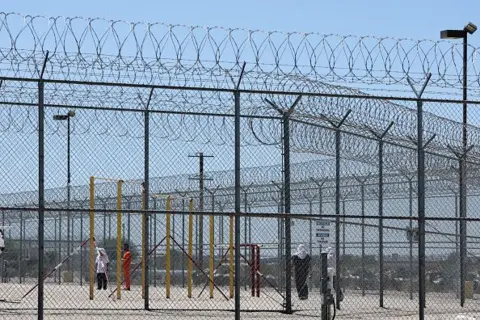 AFP via Getty Images
AFP via Getty ImagesRight now, their immediate concern is getting her out of the detention centre.
“You can put an ankle monitor on her. We can check in with immigration when you want,” said Manjit Kaur. “Just get her out of the facility and when you provide us the travel documents, she will self-deport to India.”
Her lawyer said that when he met Harjit Kaur on 15 September, she had not been provided with her regular medication. He alleged that she had been “dragged by guards”, “denied a chair or a bed” and was “forced to sit on the floor” for hours in a holding cell despite having undergone double knee replacement.
He also alleged that she was “explicitly refused water” and not provided a vegetarian meal for the first six days.
ICE did not respond to specific questions on these allegations, but had earlier told BBC Punjabi that “it is a long-standing policy that as soon as someone comes into ICE custody, they are given full health care”.
Detainees have access to “medical appointments and 24-hour emergency care” and no-one “is denied essential care at any time during detention”, it added.
Kulvinder Singh Pannu, president of the gurdwara committee at The Sikh Centre in San Francisco Bay Area, says that Bibi Harjit (a respectful way to refer to an elderly Punjabi woman) is well-liked in the area.
“She always helped people in our community with whatever she had financially,” he said.
“A couple of hundred people turned up by themselves to protest against her arrest,” he said, referring to a 12 September agitation outside the Sikh temple in California.
As the uncertainty continues, Harjit Kaur’s supporters are planning to hold more protests, including in other US cities, with many saying they are touched by her plight.
A single mother, Harjit Kaur had formed deep roots and relationships in the US over the past 30 years. Her parents and siblings in India are no longer alive, says Mr Ahluwalia.
“She has no-one, no home, no land to return to.”
Follow BBC News India on Instagram, YouTube, Twitter and Facebook.
